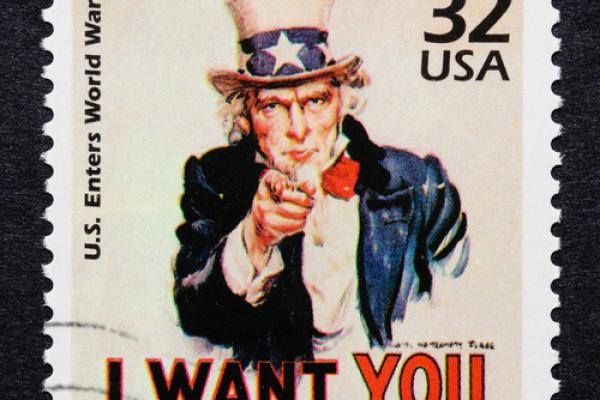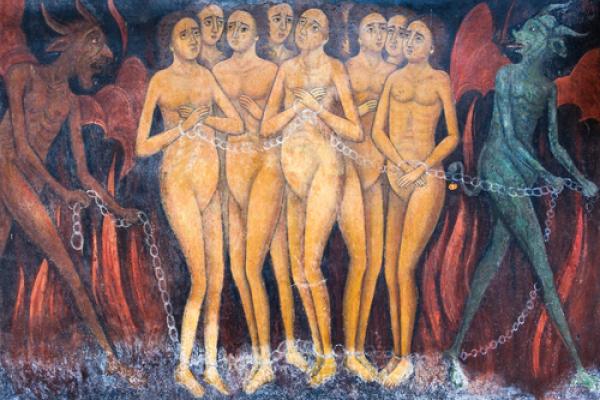 This week, in the run-up to Sunday's Academy Awards ceremony, we've been taking a look at each of the Best Picture nominees, the stories they tell, and the spiritual questions (and answers) they offer.
This week, in the run-up to Sunday's Academy Awards ceremony, we've been taking a look at each of the Best Picture nominees, the stories they tell, and the spiritual questions (and answers) they offer.
In today's final installment, we turn our attention to Lincoln, Silver Linings Playbook, and Zero Dark Thirty.
Recent news, including the Oscar nomination of The Invisible War and the looming sequester, which threatens drastic cuts in defense spending, doesn’t sound good for military recruiters. But recruiters are still active at my local high school, offering freebies and making promises. For six years I’ve been visiting the high school to encourage students to stop and think about their choices.
I’m not a biblical literalist, but I take the commandments to love your enemies, not to kill and not to overcome evil with evil seriously. I don’t make this argument at the school; it would violate their rules about religious expression, and I think it might alienate our neighbors who believe simultaneously in Jesus, the right to bear arms, and the need to fight ‘terrorists.'
I also have a concern for the truth. Many young people enlist in the armed forces without understanding what they’re getting into. My county is rural and poor; jobs are scarce. Many students who lack money or grades to make college a viable option are attracted by the promise of steady work, sign-up bonuses, travel opportunities, money for education — and sometimes, it seems, by clearly false promises.
I’ve often heard that Lent is a season of slowing down. Of drawing closer to God, to others, to the wide open world around us. A time for spiritual reflection and inner examination. An opportunity to go a little deeper in trying to figure out Jesus. A time to pause. A time for simplicity.
This Lent, I decided to get back into biking to and from work (in addition to cold showers and placing a penny in the “Suck it Up or Shut Up” jar each time I catch myself complaining).
When I moved across town in June, I said I’d bike once I found a good route, but I weaseled my way out of it for reasons such as having to bike through some sketchy areas by myself, something I was a bit fearful of.
Now a few days into it, I’ve found a route and a rhythm. I got off to a rough start the first day of Lent, biking home drenched by the down-pouring rain. Two cars didn’t see me, causing me slam on the brakes, skidding in the middle of an intersection. Cars passing by splashed water up against me like a small ocean wave. It was cold. It was dark. And I kept making wrong turns, making my time in the rain even longer. I had a “shake your fist at God” moment, muttering things that warranted pennies in the jar, and then managed to put my sopping wet hand back on the handlebar. I thought about the journey that women in Africa make to and from water wells and firewood piles on a daily basis, often risking the possibility of getting raped just to gather these essentials for their families. Surely, I didn’t have it so bad.
And most of us don’t.
 Our friends and up-and-coming musicians Branches trekked all the way from California and stopped by our office in D.C. last week to play a couple of their songs during their East Coast tour!
Our friends and up-and-coming musicians Branches trekked all the way from California and stopped by our office in D.C. last week to play a couple of their songs during their East Coast tour!
Their songs explore the ideas of doubt, faith, loneliness, love, and above all, hope for life as it was meant to be.
Best friends turned band-mates, the lady and gentlemen of Branches are an independent, self-writing and self-producing collective. Birthed in a living room in the suburbs of Los Angeles in 2010, Tyler, Natalie, Jacob, Mitch, Tyler, and Mike have since spent their time together making friends, playing shows, and writing and recording the songs for their EPs ("O, Light!", "Cabin", "Covers", "Songs For Christmas") and their full-length ("Thou Art The Dream", released 2/12).
I know I am not the only one who is sick and tired of Washington’s manufactured crises around budget and deficit debates. Brinksmanship has replaced statesmanship in trying to find a sound path to fiscal responsibility. It is time to make the right moral choices that will defend the most vulnerable and pursue an opportunity agenda to reduce the highest poverty rate in 50 years.
Ideological debates over the role of government are the real battle in the nation’s capital — more than the debt crisis. Political calculations about the next election are more important to many of our political leaders than the common good of the country.
It’s just time to move on from the partisan politics that has polarized and paralyzed us for so long — by committing ourselves to moral issues that could and should bring us together. The first will be comprehensive immigration reform, which will change the lives of 12 million people in this country, lift many out of poverty, and help the economy at the same time. This is a clear example of how the faith community has changed, and now come together to become a political game changer in Washington, D.C., at both ends of Pennsylvania Avenue on both sides of the aisle.
And it’s time to make another moral commitment in the midst of our growing economic recovery — to include poor families and change poverty into opportunity. Fighting poverty must not be a partisan issue. When we look at both the causes and the solutions, this battle should bring both liberals and conservatives together. Overcoming poverty, by creating opportunity, happens because of three very basic things that most of us can agree on: family, education, and work. All three are crucial and necessary in moving people out of poverty and into opportunity.
Let’s break it down.
Yesterday, I discussed some of the historical bases for our contemporary understanding of Satan. Today, I’ll consider how hell evolved as part of the Christian faith.
In Old Testament scripture, the resting place for the dead is called Sheol. While some believe this is the same as hell, there are indications to the contrary. In the ancient Jewish tradition, Sheol is a place of rest for both righteous and wicked, with no distinction.
Not everyone is happy about it either.
In the third chapter of Malachi, the prophet recognizes the consternation of faithful Jews who are frustrated that the wicked share the same fate. In Ecclesiastes, the priest Koheleth claims that serving God is vanity. For him, the fact that the righteous are treated the same as the wicked and vice-versa should be a call to eat, drink and be merry.
With respect to any relationship between Satan in the Old Testament and Sheol, there is none.
The drone operators sit at consoles on military bases around the U.S. They track their targets and when the moment is right, they send the command to fire. And then people die.
Drones have been in the news a lot over the past month as Congress has considered the nomination of John Brennan to head the Central Intelligence Agency (CIA). Brennan has been the chief architect of the drone policies of the Obama administration.
The constitutional questions have gotten quite a public airing, but drones raise deeper moral questions about what constraints there are on weapons of war.
Yes, drones are efficient, effective, and economical. But what do they do to the soul of this nation, to the psyches of those who push the buttons from half a world away? If they are moral for the U.S. to use at will in any nation of the world, are they moral for other nations to use against us?





